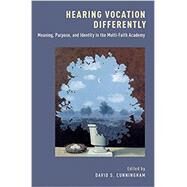Hearing Vocation Differently Meaning, Purpose, and Identity in the Multi-Faith Academy
, by Cunningham, David S.- ISBN: 9780190888671 | 0190888679
- Cover: Hardcover
- Copyright: 1/4/2019
Many colleges and universities have begun using the language of vocation and calling to help undergraduates think about the future direction of their lives. This language is used in both secular and religious contexts, but it has deep roots in the Christian theological tradition. Given the increasingly multi-faith context of undergraduate life, many have asked whether this terminology can truly serve as a new vocabulary for higher education. If vocation is to find a foothold in the contemporary context, it will need to be re-examined, re-thought, and re-written; in short, higher education will need to undertake the project of hearing vocation differently.
In this third volume on vocation from editor David S. Cunningham, the thirteen contributing scholars identify with a wide variety of religious traditions, including Buddhism, Christianity, Hinduism, Islam, Judaism, and Sikhism. Some contributors identify with more than one of these; others would claim none of them. The authors met on multiple occasions to read common texts, to discuss agreements and differences, and to respond to one another's writing; some of these responses are included at the end of each chapter.
Both individually and collectively, these contributors expand the range of vocational reflection and discernment well beyond its traditional Christian origins. The authors observe that all undergraduate students--regardless of their academic field, religious background, or demographic identity-need to make space for reflection, to overcome obstacles to discernment, and to consider the significance of their own narratives, beliefs, and practices. This, in turn, will require college campuses to re-imagine their curricular and co-curricular programming in order to support their students's reflection on issues of meaning, purpose, and identity.
In this third volume on vocation from editor David S. Cunningham, the thirteen contributing scholars identify with a wide variety of religious traditions, including Buddhism, Christianity, Hinduism, Islam, Judaism, and Sikhism. Some contributors identify with more than one of these; others would claim none of them. The authors met on multiple occasions to read common texts, to discuss agreements and differences, and to respond to one another's writing; some of these responses are included at the end of each chapter.
Both individually and collectively, these contributors expand the range of vocational reflection and discernment well beyond its traditional Christian origins. The authors observe that all undergraduate students--regardless of their academic field, religious background, or demographic identity-need to make space for reflection, to overcome obstacles to discernment, and to consider the significance of their own narratives, beliefs, and practices. This, in turn, will require college campuses to re-imagine their curricular and co-curricular programming in order to support their students's reflection on issues of meaning, purpose, and identity.






